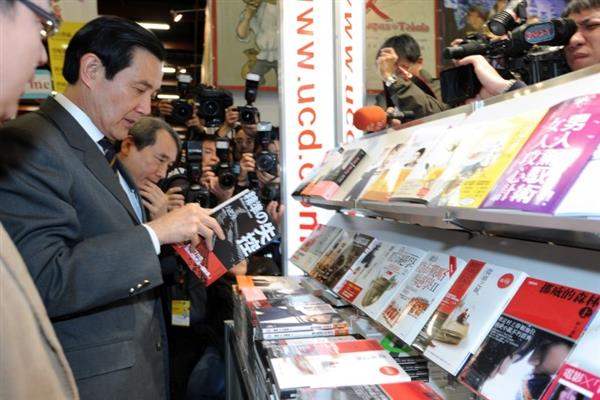News & activities
 News releases
News releases
President Ma Ying-jeou attended a press conference on the morning of February 9 marking the opening of the Taipei International Book Exhibition (TIBE) 2011. The president also bestowed the TIBE Prize of 2011 for Fiction to authors Chu Tian-hsin (朱天心), Li Wei-jing (李維菁), and Li Yong-ping (李永平), and the Prize for Non-fiction to writers Li Wei (李煒), Lu Zheng-li (呂正理), and Lien Mei-en (連美恩). The president browsed the exhibition and purchased 21 books in various genres.
In remarks at the press conference, President Ma said that reading is one of the most important aspects of the life of the mind. Reading enables us to understand the thinking of authors from different eras and places, he remarked, adding that currently there are nearly 30 million people around the globe studying Chinese and this demonstrates the importance of promoting reading.
The president furthermore stated that 10 years ago publications from Taiwan could not be found in mainland China. However, these days the works of Taiwanese authors such as Chi Pang-yuan (齊邦媛), Tsai Kang-yung (蔡康永), and Chu Tian-hsin can be found in Beijing, Shanghai, and other cities. He pointed out that the works of Liu Yung (劉墉) can be found throughout Southeast Asia, which indicates that there is increasing interaction in the Chinese-language publishing community.
President Ma believes that Taiwan's strength in publishing is one of its most important soft powers. He pointed out that Taipei features a large market for high quality publications, and is home to many outstanding editors. He noted that many writers overseas, including Nobel Laureate in Literature Gao Xingjian, have selected Taipei as a place to publish their work. In 2009, Taiwan published more than 40,000 book titles, while mainland China published 160,000 titles, he said. However, mainland China's population is 56 times the size of Taiwan's, which means that Taiwan's publishing strength is actually 14 times that of mainland China's. Based on close exchanges between the two sides of the Taiwan Strait, President Ma expressed his hopes that the Executive Yuan's Government Information Office and the Council for Cultural Affairs will strengthen promotion of publications from both sides and encourage interaction among publishing houses. He also called for this to be an important topic to discuss in future cultural exchanges between the two sides.
President Ma stressed that the TIBE not only helps to bring books into households of Chinese language speakers throughout the world, but also broadcasts Taiwan's values and perspectives to the world. This is important for Taiwan in its effort to become a standard-bearer at the leading edge of Chinese culture, he explained. President Ma also expressed his hopes that people will learn from Bhutan, which is the theme country of this year's exhibition, on how to turn economic growth and development into happiness. He also encouraged the public to buy more books, read more, and build up Taiwan as "a society that takes pleasure in reading."



